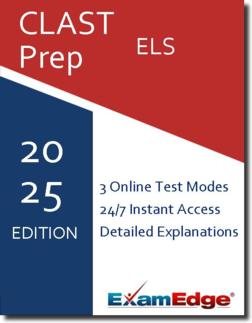CLAST ELS Practice Tests & Test Prep by Exam Edge - Topics
Based on 32 Reviews
- Real Exam Simulation: Timed questions and matching content build comfort for your CLAST ELS test day.
- Instant, 24/7 Access: Web-based CLAST English Language Skills (ELS) practice exams with no software needed.
- Clear Explanations: Step-by-step answers and explanations for your CLAST exam to strengthen understanding.
- Boosted Confidence: Reduces anxiety and improves test-taking skills to ace your CLAST English Language Skills (ELS) .



